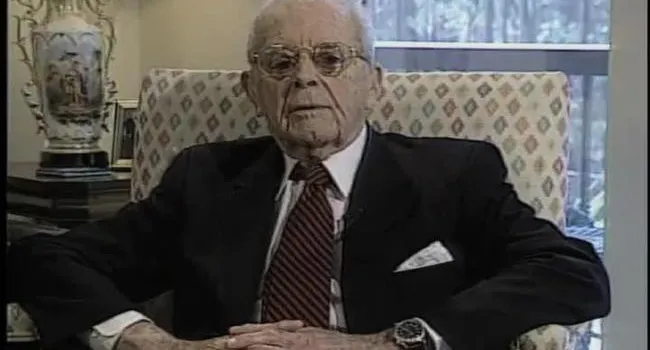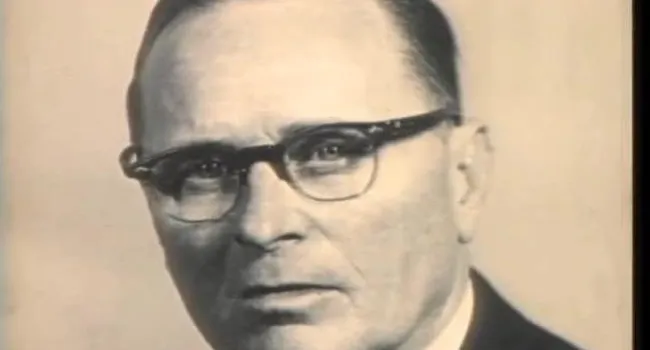1857–1926
Ambrose E. Gonzales was not only an illustrious journalist but a businessman who, against tremendous odds, kept afloat and saw flourish The State newspaper, which he and his brother, N. G. Gonzales, founded.
But if he were alive today, Ambrose Gonzales might find himself a bit bewildered that he was chosen to the South Carolina Business Hall of Fame. He took pride in his journalistic accomplishments, but he was aware that he was sometimes a soft financial touch, although he rightly prided himself on his ability "to turn a sharp financial corner."
Ambrose Elliott Gonzales was born May 27, 1857, in Paulo Parish, South Carolina, the son of General Ambrosio José and Harriet Rutledge Elliott Gonzales. His father was a brilliant and adventurous Cuban revolutionary general who battled the oppressive rule of Spain. His mother was the daughter of an erudite Lowcountry planter, William Elliott.
But he grew up in the poverty spawned by Reconstruction, learning early the work ethic. The Civil War had been costly to the Elliott and Gonzales families. William Elliott died in 1863, and Sherman's troops destroyed the Elliott family plantation home, Oak Lawn.
Jobless and broke after the war, his father tried several unsuccessful enterprises, including farming at devastated Oak Lawn and operating a sawmill. He took his family to Cuba in 1869 to accept a college teaching position. However, his wife contracted yellow fever and died after a brief illness.
After the death of his wife, the general returned with his six children to Charleston, where they were reared by their grandmother and their mother's two sisters.
By age 15, Ambrose was already known for his manners, scholarship, and his blend of practicality and idealism. He was a second father to his brothers and sisters. N. G. Gonzales, who was two years younger than Ambrose, helped his older brother by cutting wood, building fences, planting, and churning.
Educated mostly at home, Ambrose Gonzales managed brief stints in private schools in Virginia, Charleston, and Beaufort, where he early showed his business acumen by buying and selling poultry, cutting crossties for sale, and tending to matters at his family's plantation ruins.
He and N. G. landed meager jobs as telegraphers at Grahamville, South Carolina—an experience that nudged them toward careers in journalism. And the brothers became Wade Hampton's first "Red Shirts" at Grahamville.
In 1885, he joined his brother at the Columbia bureau of the Charleston News and Courier, and as general agent, he rambled all over the state and emerged as a popular figure in small towns, where his story-telling capacity, his rich baritone voice, and his generosity became legendary.
In 1891, Ambrose and N. G. Gonzales founded The State as an outspoken Columbia daily newspaper. In 1893, Ambrose became business manager, president, treasurer, and general manager of The State Company, as well as publisher of the newspaper. He retained these positions until his death.
The controversial enterprise struggled at first. It taxed Ambrose Gonzales' considerable financial skills to keep it going while his brothers, N. G. and William Elliott Gonzales, who joined the staff shortly after the paper started, concentrated on the news and editorial phases. N. G. Gonzales died January 19, 1903, four days after being shot by the lame-duck lieutenant governor, James Tillman, across the street from the State House. Ambrose was devastated. The day after his brother's death, he ended a signed editorial with these words: "With heavy hearts his work is taken over by those who loved him well, and in his name, The State is pledged anew to the principles for which he gave his life." Ambrose Gonzales kept The State alive and crusading.
Gonzales never lost his interest in writing. He made a unique and lasting contribution with his famous sketches employing the Gullah dialect. Although he had appeared in a number of light operas, he never sang in public again after the death of his brother. Even so, he retained a keen sense of humor and an abiding interest in subjects ranging from farming to opera, while devoting 35 years to the growth and health of the newspaper, which became the state's largest.
If Gonzales had a fault, it was his excessive generosity. This quality, coupled with his loyalty and devotion to the state and to Columbia, involved him in many promotions to improve the city and state. He boosted all endeavors and subscribed to everything he could afford and some he couldn't.
The fiery William Watts Ball, who served as acting editor of The State and later as editor of the News and Courier, in 1932 wrote that Gonzales was "the most important and greatest South Carolinian since Governor Hampton, though South Carolinians do not yet know it."
In his own biographical sketch, written at the request of his editors, Gonzales dwelled on his writing far more than on his business leadership.
On July 10, 1926, the day before he died, he heard bad news about his farm. He replied: "I am the most hopeful man in the world. If I knew I were to die tomorrow, I should plant seed today." Gonzales died July 11, 1926. He never married.
He was inducted into the South Carolina Business Hall of Fame in 1986.
© 1999 South Carolina Business Hall of Fame











